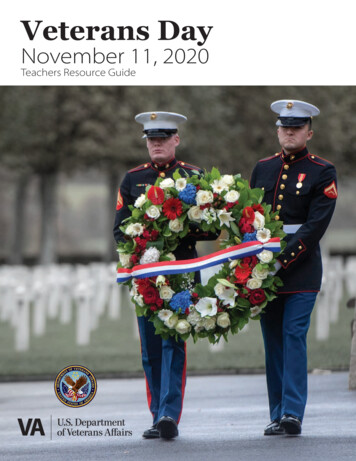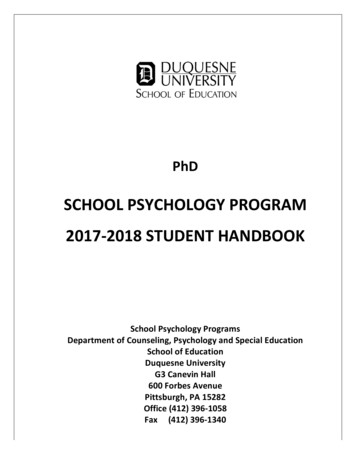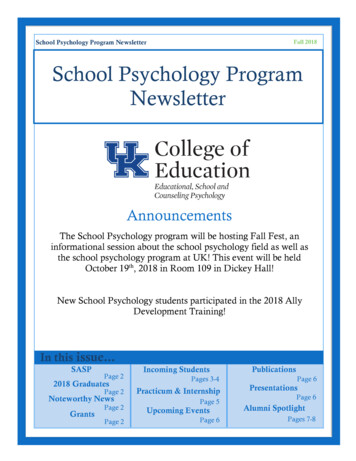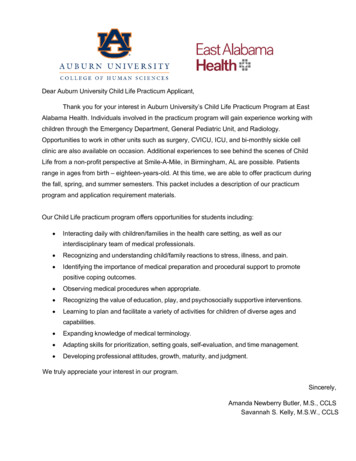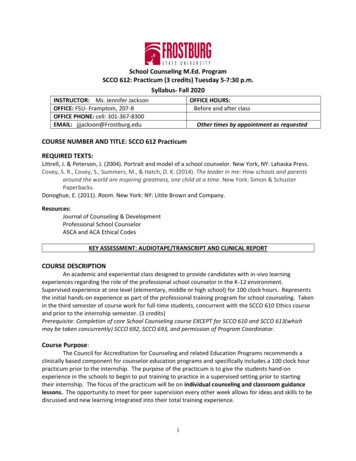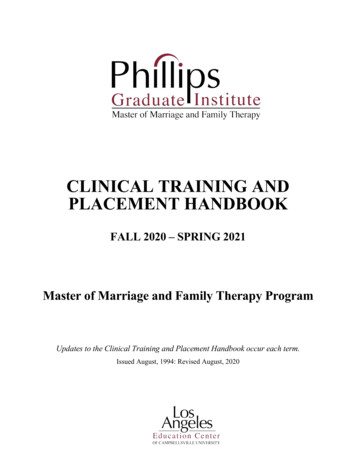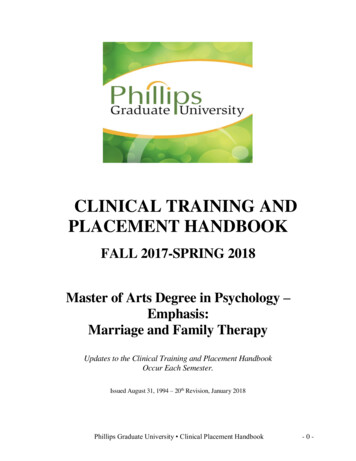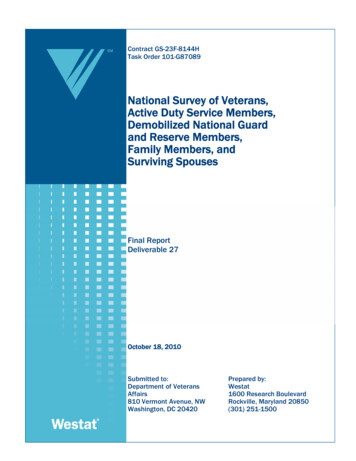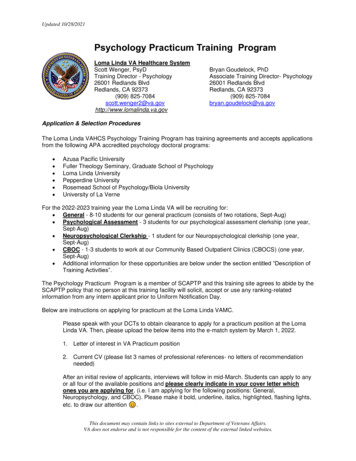
Transcription
Updated 10/28/2021Psychology Practicum Training ProgramLoma Linda VA Healthcare SystemScott Wenger, PsyDTraining Director - Psychology26001 Redlands BlvdRedlands, CA 92373(909) a.govBryan Goudelock, PhDAssociate Training Director- Psychology26001 Redlands BlvdRedlands, CA 92373(909) 825-7084bryan.goudelock@va.govApplication & Selection ProceduresThe Loma Linda VAHCS Psychology Training Program has training agreements and accepts applicationsfrom the following APA accredited psychology doctoral programs: Azusa Pacific UniversityFuller Theology Seminary, Graduate School of PsychologyLoma Linda UniversityPepperdine UniversityRosemead School of Psychology/Biola UniversityUniversity of La VerneFor the 2022-2023 training year the Loma Linda VA will be recruiting for: General - 8-10 students for our general practicum (consists of two rotations, Sept-Aug) Psychological Assessment - 3 students for our psychological assessment clerkship (one year,Sept-Aug) Neuropsychological Clerkship - 1 student for our Neuropsychological clerkship (one year,Sept-Aug) CBOC - 1-3 students to work at our Community Based Outpatient Clinics (CBOCS) (one year,Sept-Aug) Additional information for these opportunities are below under the section entitled “Description ofTraining Activities”.The Psychology Practicum Program is a member of SCAPTP and this training site agrees to abide by theSCAPTP policy that no person at this training facility will solicit, accept or use any ranking-relatedinformation from any intern applicant prior to Uniform Notification Day.Below are instructions on applying for practicum at the Loma Linda VAMC.Please speak with your DCTs to obtain clearance to apply for a practicum position at the LomaLinda VA. Then, please upload the below items into the e-match system by March 1, 2022.1. Letter of interest in VA Practicum position2. Current CV (please list 3 names of professional references- no letters of recommendationneeded)After an initial review of applicants, interviews will follow in mid-March. Students can apply to anyor all four of the available positions and please clearly indicate in your cover letter whichones you are applying for. (i.e. I am applying for the following positions: General,Neuropsychology, and CBOC). Please make it bold, underline, italics, highlighted, flashing lights,etc. to draw our attention.This document may contain links to sites external to Department of Veterans Affairs.VA does not endorse and is not responsible for the content of the external linked websites.
SCAPTP protocol and match date will be followed via e-match on April 11, 2022. We will followSCAPTP match day policies for selection via computer rank on the second Monday of April.For additional helpful information regarding the eligibility requirements for trainees at the VA please followthe links s/Trainee-Eligibility.pdfRequirements for CompletionStudents start mid-September are asked to work into August of the next year unless they are leavingearly to begin an internship. Students are asked to work 16 hours a week, no more no less whichgenerally takes place over two, eight our days to be determined by the student and the primary supervisorin each rotation. Practicum students are not allowed to work nights (past 1730) or weekends. Studentsare expected to maintain Minimum Levels of Achievement as established by their graduate school inorder to successfully complete a Practicum training experience at the Loma Linda VAHCS. TheLLVAHCS utilizes the evaluations of each practicum student’s graduate school for their evaluations whilethey train at the Loma Linda VA, therefore each student should already be familiar with the minimumlevels of achievement that are required of them prior to arriving to train here.Accreditation Status of Internship and Postdoctoral ResidencyThe predoctoral internship, postdoctoral fellowship and Neuropsychological fellowship at the Loma LindaVA are fully accredited by the Commission on Accreditation of the American Psychological Association.Our program typically trains 8 interns, 9-10 postdoctoral residents, and 12-14 practicum students eachyear.VA Loma Linda Healthcare SystemThe VA Loma Linda Healthcare System, also known as Jerry L. Pettis Memorial Veterans Medical Center,opened in December 1977. It is located on a beautifully landscaped thirty-four-acre site. The four-storyMedical Center building contains an internal space equivalent to fifteen football fields. The second-floorhouses numerous Mental Health Service staff, including the Substance Treatment and Recovery (STAR)program, pain and health psychology, embedded mental health staff in the Emergency Department, and a30-bed inpatient psychiatric unit. Other specialized treatment programs include the hemodialysis unit; theCommunity Living Center (nursing home and hospice care, 108 beds); medical and surgical intensivecare units; and a coronary care center. Neuropsychology and Homeless programs are housed in thenewly constructed Valor building, which is just North of the main hospital. In October 2016, the facilityopened a 300,000 sq. ft. Ambulatory Care Center (ACC) a mile up the road from Medical Center. Alongwith housing many Mental Health Service programs, the ACC also supports a variety of outpatient clinics2
such as primary care Patient Aligned Care Teams (PACT), Women's health, Post-Deployment Clinic,Preventive Medicine, Physical Medicine & Rehabilitation, and other specialty outpatient services.Annually, Loma Linda Healthcare System serves the medical needs of approximately 71,000 Veterans.With a dedicated staff ceiling of over 3700 VA employees, hundreds of contract staff across thecommunity-based outpatient clinics (CBOCs, and myriad volunteers, the Healthcare System providesapproximately 111,096 inpatient, and 1,236,035 outpatient encounters annually (2018). Five CBOCs andone telehealth satellite clinic affiliated with the Medical Center provide access to care to veteransthroughout San Bernardino and Riverside Counties. The Mental Health Service has a robust footprintwithin VA Loma Linda HCS, serving 23,202 unique patients and generating 204,000 encounters annually(2018). The facility is committed to its training mission and enjoys strong support. To fulfill the agency'sthree-fold mission of patient care, teaching, and research, the Medical Center is equipped with up-to-datediagnostic, therapeutic, and support equipment. Medical research programs are allocated over 40,000square feet of space, and an active affiliation is maintained with the Loma Linda University Medical andDental Schools.Psychology SettingWithin the Mental Health Service and throughout the Healthcare System, psychologists play a vital role invirtually every program. Currently, MHS employs over 60 psychologists, which include the PsychologyExecutive, 3 Supervisory Psychologists, 2 Directors of Training, and numerous key section and teamleads across both inpatient and outpatient care. Assignments for the staff psychologists are as follows:Behavioral Health Interdisciplinary Program (BHIP), PTSD Clinical Team (PCT), Primary Care MentalHealth Integration (PCMHI), Health Psychology, Pain/Health Psychology, Access/Intake Clinic, InpatientPsychiatric Unit, Neuropsychology, Psychological Assessment, Dual Diagnosis/CORE, SubstanceTreatment & Recovery (STAR), Psychosocial Rehabilitation & Recovery Center (PRRC), High RiskPsychotherapy/Suicide Prevention, Healthcare for Homeless Veterans (HCHV), Geropsychology,Community Based Outpatient Clinics (CBOCs), Compensation & Pension, and Disruptive BehaviorCommittee.The major functions of psychology within the Mental Health Service include the provision of psychologicalservices to patients, consultation, teaching, assessment, program development and outcomes evaluation.Psychologists provide comprehensive services to inpatients and outpatients within the healthcare systemand to their families through a variety of roles. In addition, they serve as members of interdisciplinarytreatment teams on both inpatient and outpatient units, coordinators of vocational and psychosocialrehabilitation programs, and serve the Medical Center as consultants.Psychology consultants from universities, local hospitals, and private practice may augment the staff.Behavioal Medicine has a strong affiliation with Loma Linda University's Graduate School of Psychologyand School of Medicine. Loma Linda VA also annually trains 10-14 Practicum Students and 10 PostDoctoral Residents. Post Doctoral Positions are available in: Health Psychology, Holistic Mental Health,Psychological Assessment, Neuropsychology, General Outpatient Mental Health (with an emphasis inthird wave behavioral psychotherapy) and PTSD Treatment. The Psychology Internship Program hasbeen accredited by the American Psychological Association (APA) since 1981.In addition to the psychological services under the Description of Training Opportunities section in thisbrochure, the Psychology Section also consists of a Vocational Counseling Program. This programprovides career exploration, vocational rehabilitation planning, job search assistance, training in jobinterviewing techniques, and referral to community based programs. It also consists of the CompensatedWork Therapy (CWT) Program, which places veterans in highly supervised, part-time positions as part oftheir vocational rehabilitation.The major functions of the Psychology Section include the provision of psychological services to patients,consultation, teaching, and program development and outcome measurement. Psychologists providecomprehensive services to inpatients and outpatients of the Medical Center and to their families through a3
variety of roles. They serve as members of multidisciplinary treatment teams on both inpatient andoutpatient units. They serve as coordinators or team leaders of a variety of programs. Remaining areasof the Medical Center are served on a consultation basis.Training Model and Program PhilosophyOur goal is to train psychology trainees to be competent practitioner/scholars in Clinical/CounselingPsychology. The underlying philosophy of our Psychology Internship Program emphasizes thatgraduates will be first and foremost psychologists who are well grounded in the theory and science ofpsychology then going on to become and function as professional psychologists in a variety of settings.Clinical applications and the process of scientific inquiry are built upon foundational psychology coursesin the interns’ curriculum and practicum experience. Many of our students go on to internship and/orpostdoctoral fellowships in a VA setting.The Veteran PopulationThe Medical Center is a federally funded teaching hospital and, as such, is dedicated to the education,research, and provision of innovative healthcare services to Veterans. Our program emphasizes anawareness of and sensitivity to cultural and human diversity as central to all psychological training andfuture practice. Our goal is to prepare psychologists to work with individuals of diverse ethnic, religious,sexual orientation, and cultural backgrounds. Within the healthcare system, approximately 10.6% of ourVeterans identify as female, and 89.4% identify as male. Among our cohort, Veterans self-identify as fromthe following racial/ethnic backgrounds: 1.1% American Indian or Alaskan Native, 2.8% Asian, 14.2%Black or African American, 2.1% Native Hawaiian or Pacific Islander, 64.8% White, 1% multi-racial, and13.8% unknown or declined to answer.According to the Census Bureau (2018 data) there are approximately 18 million military veterans, ofwhich 1.7 million are women. Veterans represent about 7% of the U.S. population over the age of 18.Most Veterans served during times of war. The number of Veterans who served during the followingperiods of service can be broken down as follows: World War II (485,000), the Korean War (1.3 million),Vietnam era (6.4 million), Gulf War (3.8 million), and Post-9/11 from September 2001 or later (3.7 million).The 2018 Census also indicates that the Veteran population is comprised of men and women who identifyin the following ethnic categories (numbers are approximate): Caucasian (13.7 million), African American(2.1 million), Hispanic (1.2 million), Other, non-Hispanic (789,000).Program Goals & ObjectivesThe comprehensive mission of our psychology practicum training is to provide our trainees with theexperiences necessary for them to become scientifically oriented, thoroughly ethical, intensively trainedand highly skilled psychologists, well-prepared and competent as entry-level professionals in thediscipline of clinical psychology in the following areas: Research, Ethical & Legal Standards, Individual &Cultural Diversity, Professional Values, Attitudes & Behaviors, Communication & Interpersonal Skills,Assessment, Psychological Intervention, Supervision, and Consultation &Interprofessional/Interdisciplinary Skills. We emphasize training in psychology within the context of aholistic approach to human health and welfare. Furthermore, as our program is located in SouthernCalifornia, a vital aspect of our mission is the education of our interns to work with individuals of diverseethnic and cultural backgrounds. Our program emphasizes an awareness of and sensitivity to cultural andhuman diversity as central to all psychological training and future practice.Please note-. Re: Rotation ClosureFrom time to time one or more of the rotation placements may be unavailable to interns. Rotationplacements should be closed to interns when they do not present good learning opportunities. This mayoccur when, for instance, a supervisor plans a prolonged vacation, there is significant reorganizationoccurring on a unit, the psychologist has just arrived on a unit and needs time to develop or solidify a role4
in the setting prior to providing supervision for interns, or when interns consistently report that a particularplacement does not provide adequate supervision. Generally when a rotation is to be closed, thesupervisor involved will be the one making the request for rotation closure. However, under somecircumstances, closure may be initiated by the Training Directors and/or the Training Committee. In sucha case, it will be the responsibility of the supervisor to develop a plan to remedy the problems.Please note-.Re: COVID 19 and telehealth/teleworkingThe COVID-19 pandemic has created numerous personal and professional challenges for us all. One ofthese challenges is uncertainty about what will happen next week, next month, and especially one yearfrom now.The Loma Linda VAHCS Psychology training program has prided itself on its transparency, providingdetailed and accurate information about our program and training opportunities. With COVID,transparency means we cannot definitively predict how specific rotations or adjunctive trainingopportunities may evolve for the 2022/2023 training year.We can say that there will likely be more utilization of telehealth and technology-based delivery platforms.We do not expect there to be any significant changes to the base clinical services or populations servedthrough rotations and adjunctive experiences described in our materials. Although a lot happened in 2020and 2021 with all trainees and many staff abruptly shifting to providing clinical services and trainingremotely, our dedication to high-quality clinical care and psychology training, and our dedication to thetrainees themselves has never been stronger.We will update our public materials as we know more about what will be for the 2022/2023 training year.Please feel free to reach out to us if you have any questions. Contact information can be found at thebottom of the Application Process page.Please note-.Re: COVID 19 vaccine and random drug testingHealth Professions Trainees (HPTs) are appointed as temporary employees of the Department ofVeterans Affairs. As such, HPTs are subject to laws, policies, and guidelines posted for VA staffmembers. There are infrequent times in which this guidance can change during a training year whichmay create new requirements or responsibilities for HPTs. If employment requirements change duringthe course of a training year, HPTs will be notified of the change and impact as soon as possible andoptions provided. The VA Training Director for your profession will provide you with the information youneed to understand the requirement and reasons for the requirement in timely manner. In light of this, theVA system recently mandated that all HPT’s provide proof of COVID vaccination or providedocumentation of a religious or medical exemption why they are not vaccinated. Failure to provide thisproof would make an HPT unable to train in the VA system.Additionally, VA employees and HPT are subject to random drug testing, please take a moment to reviewthe VA system drug policy below. rl https%3A%2F%2Fwww.va.gov%2FOAA%2Fonboarding%2FVHA HPTsDrugFreeWorkplaceOAA HRA.pdf&data %7C1000&sdata 3D&reserved 0)5
Description of Training Experiences for the GeneralPracticum Rotations (consists of two rotations, Sept-Aug) :ACUTE PSYCHIATRY, CONSULTATON & LIAISON, AND EMERGENCY SERVICE TEAM (ACE):The ACE Team provides services to Veterans located at the VA Loma Linda Main Hospital, which housesall emergency services and our inpatient medical and psychiatric units. Training opportunities within theACE Team are split between two separate rotations: the ACE - ACUTE PSYCHIATRIC UNIT rotation andaspects of the CLINICAL HEALTH PSYCHOLOGY rotation (listed separately in the brochure). Trainingactivities with the ACE Team offer trainees the opportunity to work in a highly dynamic and fast-pacedenvironment while learning specialized skills in treatment and assessment. ACE rotations especially helpprepare the trainee for opportunities in inpatient psychiatry, forensics, consultation-liaison psychology,neuropsychology, geropsychology, and rehabilitation psychology. Interns on either rotation will receivesupervision from licensed clinical psychologists working on the ACE Team with additional supervision andmentoring provided by additional psychology staff and medical staff (particularly board certified psychiatristswho work on our acute psychiatric unit, consultation & liaison service, and emergency department).Psychology trainees will also have the opportunity to work closely with trainees of other disciplines includingmedical residents and fellows, medical students, nursing students, and social work interns.Please note that training opportunities within the ACE Team necessitate trainees to be present on-site torender face-to-face care (when possible with considerations to the COVID-19 pandemic conditions) due tothe nature of the inpatient populations we serve. Trainees will be provided with education on all propersafety and health precautions at the beginning of their rotation, and will be provided with any PPEdetermined necessary per guidance from VA Loma Linda’s Infectious Disease Clinic.ACE - ACUTE PSYCHIATRIC UNIT ROTATION:This rotation is located on the Acute Psychiatric Unit (APU), with possible limited or peripheral roles withthe Consultation and Liaison service and/or Emergency Services. Trainees will work with aninterdisciplinary team in providing care to Veterans hospitalized psychiatrically. Trainees will get anopportunity to work with individuals with severe mental illnesses (SMI). Diagnoses treated includesubstance use disorders, schizophrenia spectrum disorders, bipolar disorders, major depressive disorder,and PTSD as well as various personality disorders.This rotation can be adapted based on the trainee’s interests and experiences, but will generally includethe following: Trainees will obtain experience leading/co-leading daily process and psychoeducational groups(e.g., DBT Skills, Introduction to CBT). Trainees will get exposure to psychological assessment and report writing. This includespsychodiagnostic assessments and brief neuropsychological screens to help with differentialdiagnosis and treatment planning. Trainees may gain experience with 1:1 therapy with patients on the unit, primarily in a SolutionFocused therapy model. Additionally, trainees will get exposure to intake interviewing focused ondifferential diagnosis and treatment planning utilizing the DSM 5. There may also be some opportunity for trainees to observe and assist the Emergency Servicesteam in on-call coverage, including triage in the emergency room. Trainees may have the opportunity to serve on the Disruptive Behavior Committee (DBC) as atrainee-liaison for the APU. Additionally, the trainee will conduct risk assessments, and presentfindings in a multidisciplinary environment. Trainees may be involved with providing individual and group chronic pain treatments to inpatientVeterans including CBT for Chronic Pain, ACT for Chronic Pain, and Biofeedback. There may also be some opportunity for trainees to observe and assist the Emergency Servicesteam in on-call coverage, including triage in the emergency room.BEHAVIORAL HEALTH INTERDISCIPLINARY PROGRAM - EVIDENCE-BASED SERVICES (BHIPEBS):6
The trainee on this rotation will be supervised in the provision of evidence-based psychotherapy serviceson teams within the Behavioral Health Interdisciplinary Program (BHIP-Treatment). Activities include theprovision of evidence-based treatments to a diverse population of individuals and groups; treatmentplanning; and participation on an interdisciplinary treatment team. Interdisciplinary teams are usuallycomprised of psychologists, psychiatrists, nurse practitioners, LVN’s, social workers, pharmacists, andadmin support staff.There are many training opportunities available on the BHIP-EBS rotation. Below are listed multipletraining opportunities; not all training groups or types of treatments may be available at any given timebased on staffing, available supervisors, groups sizes, flow of patients, demands or needs of the BHIPteam, DBT team, etc. Supervisors use a developmental model of supervision; as such, the amount oftraining and various levels of training below are based in part on the trainee’s experience, level of training,and what experiences may round out their experience. Not all training opportunities are guaranteedbased upon this. We as a team of supervisors do our very best to make sure that interns get good trainingand get most of what they are aiming to round out in their training.STANDARD TRAINING EXPECTATIONS: Participation as an effective member on an interdisciplinary treatment team includingcollaborating with other disciplines. This may include presenting intakes and therapy cases to theinterdisciplinary team and providing feedback to members of the team on cases and course oftreatment, etc. Provide Intakes to conduct biopsychosocial evaluation of patient, determining diagnoses,appropriate treatment planning for patients, consulting with psychiatrist for medications forpatients new to mental health and providing referrals to various types of group and individualtherapies. Ongoing treatment planning meetings with patients to revise their treatment plans once they arein the program. This often involves some education on types of treatments, levels of treatment,and some motivational interviewing. Evaluation to determine patients' candidacy, readiness, and appropriateness for various forms ofEvidence-Based Psychotherapies.SELECTIVE TRAINING OPPORTUNITIES: Co-lead/Lead an Evidence-Based Psychotherapy group: CBT-Depression groupACT Depression/Anxiety groupCBT-Anxiety groupCBT-Insomnia groupCBT-Chronic Pain groupREACT group (CBT & DBT skills for Anger Management)DBT-Bipolar groupManaging Behavior & Affect (MBA) group: DBT SkillsProvide Individual Evidence-Based Psychotherapy-CBT-Depression or AnxietyAcceptance and Commitment TherapyCBT-InsomniaCBT-Chronic PainCBT-Anger ManagementLIMITED ELECTIVES: (not all of these will be possible on one 4-month rotation. Usually interns cancomplete 1-2 limited electives due to time constraints).7
Participate on full Dialectical Behavioral Therapy (DBT) consultation team including using DBT tohelp other clinicians, discussing cases, co-leading a DBT skills group as part of the full DBTprogram, and learning DBT in the weekly team meeting. Opportunities to teach DBT skills(provide skills coaching) to individual patients on a short-term basis. Please note that this trainingoption would limit your availability to participate in other activities.PTSD Coping Skills groupCPAP Desensitization group (systematic desensitization)Co-ed General Coping Skills groupMindfulness and Compassion groupParenting with PTSD groupLimited opportunities to learn Biofeedback/NeurofeedbackLimited opportunities to do trauma-focused work such as providing Cognitive Processing Therapyfor PTSDBHIP-EBS can also be split with a half time Psychological Assessment experience. Opportunities wouldbe to gain exposure to psychological testing administration, scoring, and interpretation, and report writingskills for the benefit of veterans within BHIP services. Interns are to learn how to utilize psychologicalmeasures within a clinical setting and provide feedback to a multidisciplinary team to further treatment forpatients. Training Goals/Objectives are to gain knowledge and experience in administration, scoring, andinterpretation with: MMPI-2, MCMI-III, PAI, 16-PF, and other psychological measures to assist in thetreatment planning of patients.C.O.R.E. (Co-occuring Recovery Empowerment Program)/PRRC:This training opportunity is split between the C.O.R.E (Dual Diagnosis program) and the PsychosocialRehabilitation Recovery Center (PRRC).A. C.O.R.E. is a multidisciplinary treatment program providing outpatient treatment for veterans withsevere and persistent mental illness and substance use disorders. The program is a residentialtreatment program with most veterans living in recovery or sober-living houses while they attendtreatment activities at the ACC. The program is 9- to 12-months long, or longer. The C.O.R.E.program provides services for veterans with substance abuse and severe persisting co-morbidmental disorders. It is a day treatment program currently staffed by three psychologists, anaddiction therapist, a peer support specialist and two social workers. The program consists ofgroups, individual therapy, psychological testing, case management and work therapy.Possible opportunities include: Facilitation of the Assessment and Evaluation Group (Readiness Group), which assessespatients’ readiness for treatment utilizing Motivational Interviewing/Motivational EnhancementTherapy (MET), also opportunity for individual MI/MET sessions with veteransFacilitation of a 16 session Harm Reduction group seriesGroup therapy-trainee will lead a 3 x a week DBT skills group (Phase 2) as well as a 1 x weekACT/DBT/Mindfulness based group (Phase 3)Become familiar with the DSM criteria of substance use disordersTreatment PlanningPsychological Assessment - opportunity for MMPI/PAI/MCMI/RORSHACH as well as cognitivescreeningsOpportunity to co-facilitate and teach PTSD coping skills in weekly C.O.R.E. phase 2 skills groupBrief individual therapy and case managementCrisis Intervention to evaluate and assess for s/i, h/i, and other high-risk psychiatric issues.Consultation with other treatment programs/providersFacilitate and teach DBT skills/ACT skills in a group setting for Phase 1 and Harm Reductiongroup veteransPsycho-educational groups (CBT-D, CBT-A, Relapse Prevention)8
B. In the PRRC program the trainee is a member of multidisciplinary treatment teams and contributesactively to all phases of assessment, treatment planning, and intervention. The trainee will haveopportunities to interact with pharmacists, physicians, nursing staff, social workers, addition therapistsand peer supports in a Recovery Model based training environment. The psychology trainee can expectto assume responsibilities and gain supervised experience with a variety of diagnoses and be exposed toveterans with a wide array of persisting mental illnesses.Specific activities may include: Individual therapy Group therapy Psycho-educational groups (Social Skills/Assertive Communication/Cognitive Therapy/AngerManagement) Psychological assessment for diagnostic clarification and treatment planning Program planning Consultation with multi-disciplinary team Crisis intervention Family Meetings/Family Group**Practicum students must be able to be here on Mondays and Wednesdays.GEROPSYCHOLOGY:A. The trainee on the Geropsychology rotation works with four main populations on the Community LivingCenter (CLC): Veterans with a skilled nursing need due to medical condition(s), Veterans receiving acutephysical rehab, Veterans admitted for hospice care, and Veterans that require a secured environment dueto a behavioral need (advanced neurocognitive impairment or those on conservatorship). Psychology isan active member of the treatment team and provides therapy and assessment for Veterans who aredealing with issues related to aging, loss of function, cognitive decline, and grief and loss. Psychologyalso provides care for terminally ill veterans and their families as they face end-of-life concerns and is partof the hospice care in the CLC as well as the outpatient Palliative Care Consult Team.B. The typical age is 65 , with age ranging from 20 through 100. Veterans present with a wide array ofconditions to include affective disorders, adjustment disorders, PT
Scott Wenger, PsyD Bryan Goudelock, PhD Training Director - Psychology Associate Training Director- Psychology 26001 Redlands Blvd 26001 Redlands Blvd . Rosemead School of Psychology/Biola University University of La Verne For the 2022-2023 training year the Loma Linda VA will be recruiting for:


